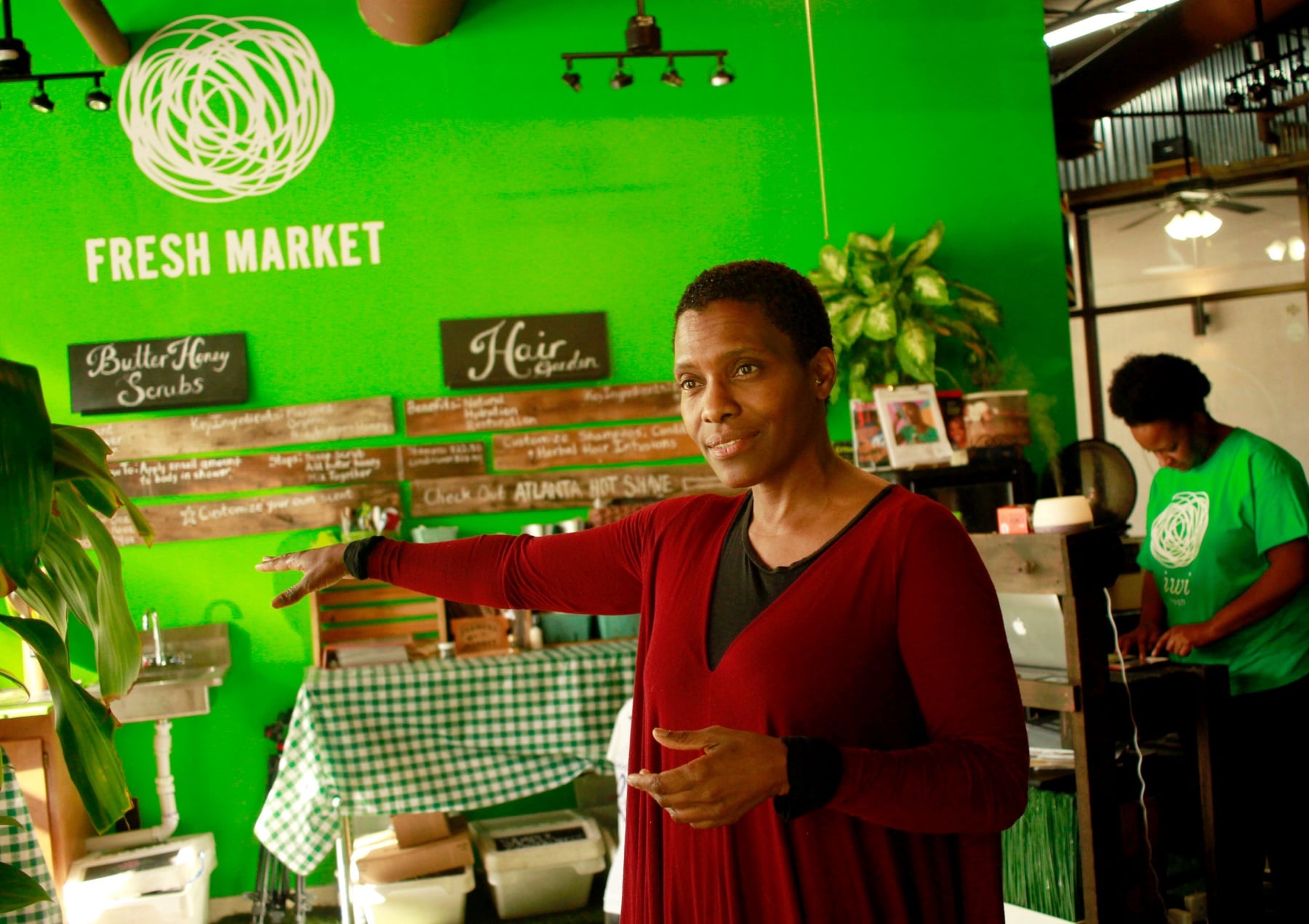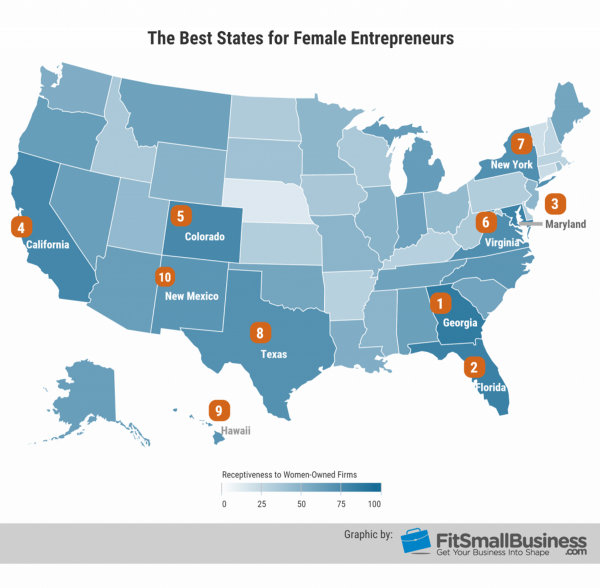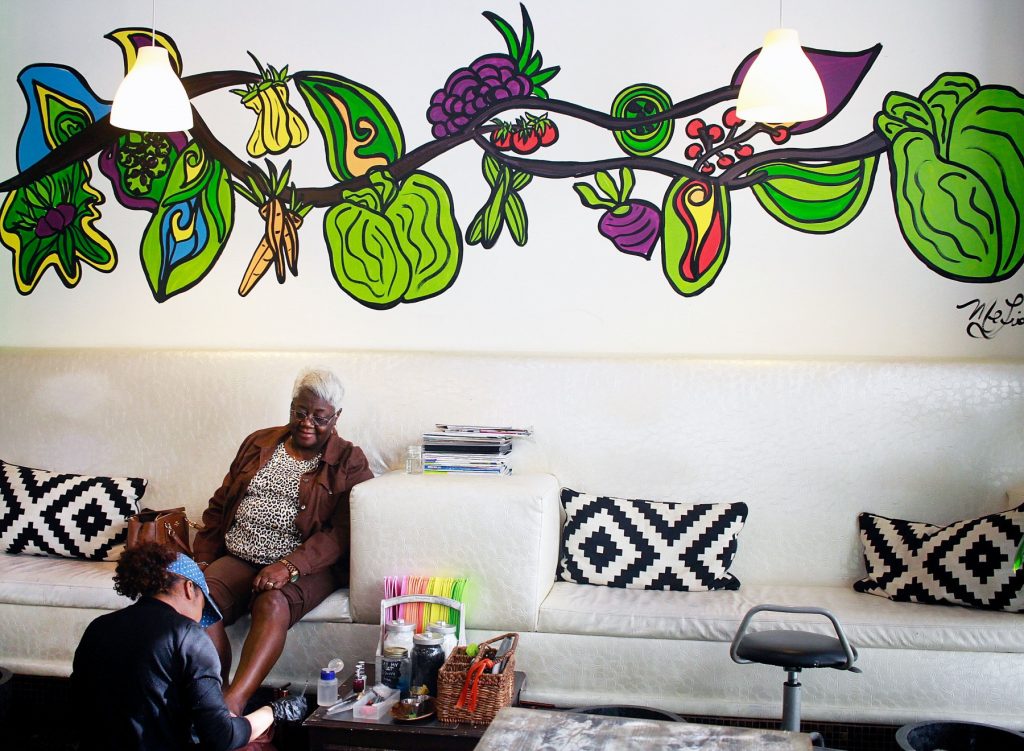Report: Georgia Women Lead US In Business Ownership

Yolanda Owens, the owner of the iwi fresh spa in downtown Atlanta, said she mostly used her retirement savings to fund her business from her previous career as an engineer. For many women, raising money for their businesses remains an obstacle.
Kaitlin Kolarik / WABE
A website for small business owners recently used census data to rank Georgia No. 1 in the United States for women-owned businesses.
But a key challenge for women in Georgia is raising money.

iwi fresh
The iwi fresh spa in downtown Atlanta smells nothing like your typical nail salon. It calls itself a “Farm-to-Skin” spa, and employees are called “farmers.”
The spa is covered in greenery, and there’s a wide range of smells, including cucumbers, beet roots and turmeric, because all of the products for pedicures, manicures, haircuts and massages are from local farms and gardens.
Employee Shantae Robinson has a farmer name of “Dragonfruit.”
“We go out and pick fresh fruits, vegetables and herbs and bring them here to iwi kitchen, where the skin care chef, Yolanda Owens, juices all the fruits and veggies and mixes them to create skin care recipes from her grandmother’s home remedies,” Robinson said. “If you can’t eat it, you should not put it on your skin.”
Her boss, Yolanda Owens, started the business in Atlanta about 14 years ago. She credits her success to Southern hospitality.
“I can always tell my Southern women because they just have a more supportive and caring and loving piece, and I think that’s what you get in Georgia,” Owens said.
In addition to this informal mentorship network, she also found financial and technical support through statewide programs and local programs like SCORE Atlanta. Owens said she mostly used her retirement savings to fund her business from her previous career as an engineer, but for most women, obstacles remain.
Raising Capital

Christopher Hanks leads Kennesaw State University’s entrepreneurship center.
“Women still rank lower than men as far as raising capital,” Hanks said. “And access to capital to scale businesses.”
Nationally, about 40 percent of small businesses are owned by women, but these companies receive less than 2 percent of venture capital funding.
Hanks said it’s why Kennesaw State University organizes events and fellowships targeting women entrepreneurs, providing both funding and advice on starting a business.
Owens said she felt she faced more scrutiny then her male peers when trying to raise money to scale or grow her business.
“There’s a stigma that comes with being a woman and being a minority. Everything needs to be perfect, and it’s not,” Owens said. “And so they look at your credit, they look at your history of how you’ve done things, and when you’re just starting your business out on your own, you don’t have those things.”
WEI Atlanta
To help early stage female entrepreneurs, the city of Atlanta started the Women’s Entrepreneurship Initiative.
WEI executive director Theia Washington Smith said it’s “still to my knowledge, the only city-funded initiative of its kind in the nation that’s completely focused on women entrepreneurs.”
Atlanta invests about $285,000 into the program each year. The cost covers staff and an annual operating budget of about $35,000. The developers of the historic Flat Iron building downtown provide the group with free rent in exchange for financial incentives from Invest Atlanta.
Government Bids
Smith has also helped graduates of the incubator program bid for contracts with the city.
The city of Atlanta Mayor’s Office of Contract Compliance provides formal training for women-owned businesses to learn how to navigate and bid for city contracts.
“There’s specific programming around helping women and minorities in different departments,” Smith said. “Watershed is very strong as is the airport.”
According to its website, the office was set up to “mitigate the effects of past and present discrimination against women and minority businesses.”
“The City of Atlanta has found that African American, Female, Hispanic, and Asian American owned businesses have suffered the effects of racial and gender discrimination in both public and private markets, resulting in the disproportionate award of contract dollars to non-minority or non-female businesses,” the website states.








